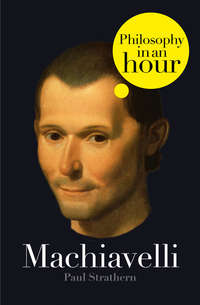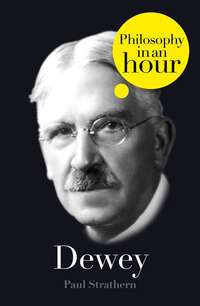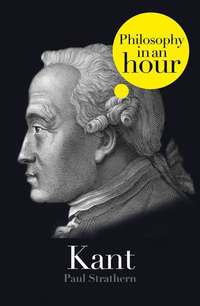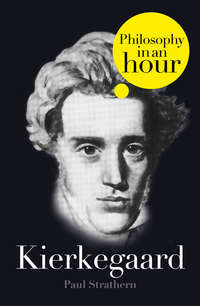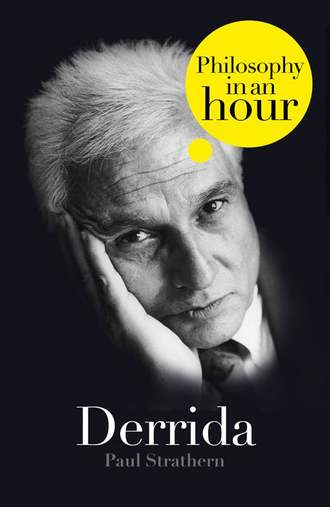
Полная версия
Derrida: Philosophy in an Hour

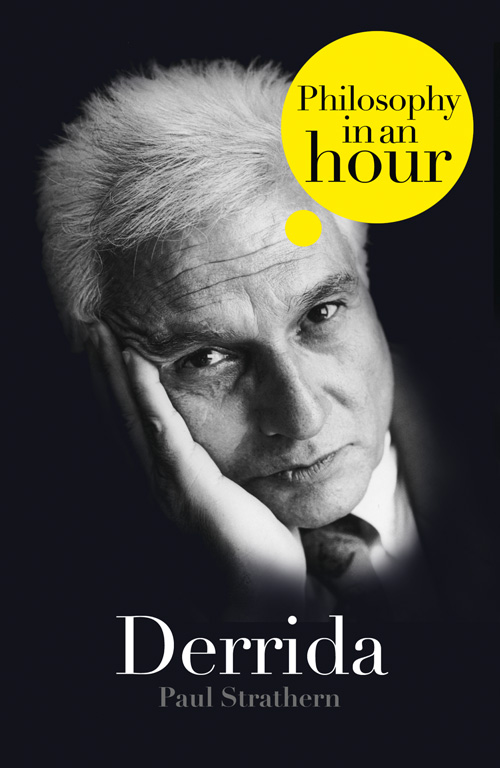
Derrida
PHILOSOPHY IN AN HOUR
Paul Strathern

Contents
Cover
Title Page
Introduction
Derrida’s Life and Works
Further Information
Derrida: Mixed Quotes and Mixed Reviews
Chronology of Significant Philosophical Dates
Chronology of Derrida’s Life and Times
Recommended Reading
About the Author
Copyright
About the Publisher
Introduction
“I love nothing better than remembering and Memory itself,” claimed Jacques Derrida in his 1984 memoir of his close friend, the philosopher Paul de Man, who had recently died. Yet at the same time Derrida confessed: “I have never known how to tell a story.” These two characteristics are far from being contradictory for the author. As he says of himself: “It is precisely because he keeps the memory that he loses the narrative.” The image remains “legible”; incorporating it in a “story” inevitably blurs this legibility, imposing interpretation. So far so good. It thus comes as something of a surprise when we discover that the ensuing memoir contains not a single image of his friend and absolutely no memories of him. Needless to say, there is not even a hint of story about him: this would impose interpretation. Yet paradoxically this entire so-called memoir is devoted to an interpretation of his friend’s intellectual achievement. In his own words, Derrida “dialogues obliquely” with de Man’s work, obscurely interpreting it with regard to “prudent explication” and “a battery of performative acts” by such figures as Heidegger, Austin, Hölderlin, and Nietzsche.
Any clear, commonsense approach to Derrida’s work thus labours under a severe disadvantage. Worse still, it goes completely against the author’s intention. It is therefore only fair to warn the reader that my attempt at clarity in the ensuing description of Derrida’s life and work would be regarded by its author as both counterproductive and hopelessly biased. Wit, on the other hand, is definitely permitted. Derrida is a great believer in jokes, puns, and humour. Yet here again we suffer a setback: this is specifically French intellectual humour. It derives from that modernist tradition of European Continental art and thought known as “the absurd.” When confronted with an absurd situation, innocent outsiders living beyond this privileged intellectual territory are wont to laugh. Such naiveté displays a woeful misunderstanding. The absurd is a notion of utmost seriousness. Similarly with Derrida’s humour. This is no laughing matter. It is not funny (except to French intellectuals). Such humour doesn’t play for laughs. Derrida may share a Jewish background with Woody Allen, but by no stretch of the imagination do they share a common humour. Whether the Manhattan hypochondriac or the great Parisian intellectual sheds more light on our varied humanity – in other words, is more “serious” – is another question.
Derrida’s Life and Works
Central to Derrida’s “deconstructionist” philosophy is his insistence: “There is nothing outside the text.” Despite this, and no matter which textual form it takes, the fact that Jacques Derrida was born in Algeria in 1930 would appear to remain impregnable to deconstructive assault. His family were petit bourgeois “assimilated” Jews, both part of the French colonial class and yet partial outsiders within it. He grew up in the capital, the seaside city of Algiers. Here the Europeans lived the easygoing empty Mediterranean life revolving between business, café, and beach – so tellingly evoked by the French-Algerian writer and philosopher Albert Camus in The Outsider. Derrida lived on rue Saint-Augustin, a fact that would play a leading yet somewhat serendipitous role in his 1991 autobiography. This he called Circumfession, its title implying the two main topics: circumcision and confession. Yet by the end of the work we are left little the wiser about details of either. At one point, apparently referring to himself, Derrida writes: “he circumcises himself, the ‘lyre’ in one hand, the knife in the other.” Yet some pages later he writes: “Circumcision remains the threat of what is making me write here.” The confessional element is equally muddied. At one point he addresses the reader with regard to his mother: “I lied to her all the time, as I do to all of you.” There follows a long Latin quotation from The Confessions of St. Augustine. Derrida’s “circumfession” has many Latin quotes from St. Augustine, with whom he seeks to identify. St. Augustine was in fact born in 354 A.D. in the Roman colony of Numidia, whose territory now forms part of Algeria. Other resemblances to the early Christian philosopher and religious confessionist are more fleeting. Besides identifying with St. Augustine, Derrida also fantasises about him, envisioning the Christian saint “as a little homosexual Jew (from Algiers or New York),” and even refers to his own “impossible homosexuality.” At another point he professes: “I do not know Saint Augustine.” Having established this much, we can now move on to more factual ground.
In 1940, when Derrida was just ten years old, Algeria was dragged into World War II. Although the country never saw fighting, or even so much as a German uniform, the war cast its pestilential shadow over life in the French colony, which had now become a protectorate of the Nazi empire. Again, Camus captures the atmosphere of the period, this time in The Plague. France had been overrun, and French Algeria was governed by the collaborationist Pétain regime. In line with Nazi decrees, in 1942 racial laws were introduced, bringing to the surface a latent anti-Semitism amongst the European population. Derrida was informed by a master at school: “French culture is not made for little Jews.” It was the privilege of the top pupil to raise the French flag each morning at school; but in Derrida’s case this was reassigned to the second in the class. A quota system was introduced limiting each lycée (high school) to 14 percent Jews. Derrida’s headmaster soon took it upon himself to reduce this quota to 7 percent, and Derrida was expelled. At street level such attitudes degenerated to name-calling and even violence.
The effect of all this on an exceptionally intelligent, sensitive pupil can only be imagined. It is also equally understandable that the man who emerged from this experience should deny the effect of his early life on his later thought. After all, his avowed aim was to interrogate philosophy, not himself. Consequently he remained averse to supplying personal details that appeared to provide a causal link between his life and his work. And with some justice. It should be remembered that the mature survivor thought out his philosophy despite such attempts to sabotage his intellectual and social life.
For a while, the early teenage Jacques received no education. He was enrolled at the unofficial Jewish lycée but secretly played truant most of the time. He was aware of “belonging” to Judaism; yet though he had grown up assimilated into European society, he now felt he was not a part of it. His painful experience led him to reject racism of any sort; yet in the words of his collaborator Geoffrey Bennington, he also experienced “impatience with gregarious identification, with the militancy of belonging in general, even if it is Jewish.”
Upon the resumption of normal education after the war, Derrida became a disruptive pupil, successful only on the playing field. He dreamed of becoming a professional football player. Such an ambition may not have been quite so philistine as it appears. Just over ten years earlier, Camus had played in goal for Racing Algiers. And it was during this period that Derrida overheard, by chance, a talk about Camus on the radio, which attracted him to philosophy. Derrida’s hero was a thinking man of action.
Despite his teenage rebellion, Derrida’s exceptional intellect remained unmistakable. At nineteen he was sent to Paris to study for entry to the École Normale Supérieure, the most prestigious higher-education establishment in France. But living alone amidst the grey cold streets of Paris proved an alienating experience after the sea and sunlight of Algiers. Derrida found himself drawn to the nihilistic existentialist philosophy of Sartre, which was then all the rage in the student cafés of the Left Bank. Sartre asserted “existence before essence.” He maintained that there was no such thing as an essential humanity. Our subjectivity was not given to us: we create it ourselves by our actions. The way we choose to live makes us who we are.
As a result of exam pressure, disorientation, and pill-taking (amphetamines and sleeping pills), Derrida walked out after taking his first exam and suffered a minor nervous breakdown. In 1952, at his second attempt, he gained admission to the École Normale Supérieure, where he studied philosophy for the next five years. Here Derrida began a close reading of the two figures who had most influenced Sartre, the German philosophers Husserl and Heidegger. These early-twentieth-century thinkers had been instrumental in developing and elaborating phenomenology, “the philosophy of consciousness.” This insisted that our fundamental consciousness lies beyond the reach of rational proof or scientific evidence. It is accessible only to intuition. By means of this alone we arrive at the central problems of being, of existence itself. The basis of all our knowledge thus lies beyond reason and science: our knowing is grounded in consciousness.
In 1954 the Algerian War broke out when the local Arab and Berber populations rose against the French in a bid for independence. Derrida supported the struggle for independence, but after graduating in 1957 he was called up to serve in Algeria with the French army. He volunteered to teach and was posted outside Algiers to a school for the children of French and Algerian soldiers in the French army. Derrida found himself torn by the increasing atrocities on both sides, but still hoped for an independent Algeria where Europeans could coexist with their Arab and Berber neighbours. Derrida’s family had lived in Algeria for more than five generations and regarded themselves as Algerians rather than French. In 1960 he returned to France, where he obtained a post teaching philosophy and logic at the Sorbonne, part of the University of Paris. He was now married to Marguerite Aucoutourier, who had been a fellow student at the École Normale Supérieure. She had accompanied him to Algeria but was unable to prevent him from suffering a severe depressive episode after his return. The war would end with Algeria’s independence in 1962 and the mass exodus of Europeans. Derrida’s cherished hope of becoming a citizen of an independent Algeria was shattered; from this time on he would frequently experience feelings of what he called “nostalgeria.” But 1962 would also see the inception of Derrida’s own independence as a philosopher, with the publication of his first important work. To a translation he had made of Edmund Husserl’s Origin of Geometry he appended a book-length Introduction which dwarfed Husserl’s essay-length work.
Husserl had originally been a mathematician, which led him to see the danger of phenomenology basing all knowledge on intuition or the immediacy of individual apprehension. If the basis of all knowledge lay beyond reason and science, how could one know the truth of anything that was not based upon his own intuition? This meant that mathematical and scientific knowledge was relative. Such propositions as 2 + 2 = 4 were not incontrovertible, they just arose from one’s intuition of the world. Others might intuit things differently. In which case one would have no grounds to refute them.
Husserl sought to rescue philosophy from this difficulty, which threatened to undermine all knowledge. He took geometry as the most certain form of our knowledge, using it as a paradigm for all scientific and mathematical knowledge. If our knowledge of geometry could be shown to be beyond relativism, this would secure the truth of all such science.
Husserl argued that geometry must have had a historical origin. Its origin lay in an original intuition by a historical human being. On a particular day in prehistory a particular individual must have had an intuition of line, or distance, or possibly even of a point. In this subjective way geometry – line, distance, point, and so forth – had begun. Such original terms must have had a clear, irrefutable meaning, first grasped by intuition. But once these terms had been grasped by intuition, the rest of geometry was simply a matter of discovering the logical implications of these grounding assumptions. In ancient Greek times Euclid had shown how the structure of geometry was built up from such basic concepts. Geometry itself was somehow “already there,” waiting to be discovered, abiding its historical moment. Once the original notions had been intuited, the rest was incontestable: there could be no relativism about it. All scientific and even philosophical knowledge worked in this manner. Yes, in line with the strictures of phenomenology it was certainly grounded on intuition (historically speaking). But no, it was not relative, because it followed on from these original intuitions by logical steps that uncovered a structure that was in a way “already there,” just waiting to be discovered.
Derrida was convinced that this argument contained an aporia, an internal inconsistency which remained irresolvable. And in arguing this in his Introduction to Husserl’s Origin of Geometry, and in later works, he laid the basis for his philosophical attitude. For Derrida’s “philosophy” is not a philosophy as such, it is rather a questioning of philosophy: an “interrogation of its very possibility.” He questions the entire basis of philosophy and its ability to operate on its own terms. The whole structure of philosophy is flawed by an aporia, and as such it cannot be consistent. This was more than an obscure argument about the basis of geometry: it questioned the possibility of philosophy itself. And as such, the grounds of all knowledge.
According to Derrida, Husserl saw geometry as a form of perfect knowledge, which existed in a realm of timeless truth. It was incontestable and remained true regardless of human apprehension or intuition. For Derrida, any possible prehistoric intuition was irrelevant to the way geometry had come to be regarded in history, as the paradigm of all scientific and philosophical truth. This was an ideal truth, beyond the realms of argument. Derrida contested this. Even if the basic concepts of this truth had been historically (or prehistorically) intuited, the truth itself was not grounded in lived experience. According to Husserl, it had already existed “out there,” waiting to be discovered. Hence this truth could not possibly be grounded in lived experience. It was not consciously intuited – the necessary grounding required by phenomenology for all knowledge. Here at the very heart of philosophy was an aporia. By implication, our entire notion of knowledge was inconsistent. Either our knowing was grounded in intuition, or it wasn’t; it couldn’t somehow be both. How do we know that geometry is “out there” waiting to be discovered? And surely we accept geometry as true because we apply logic to it, rather than intuit this? It may be logically consistent within its own terms, but how do we intuit it as knowledge? What basis in our consciousness – the ultimate grounding of our knowledge – do we have for accepting its truth?
Such questions may appear niggling, but their implications affect the whole of Western philosophy and the scientific knowledge that is based upon it. Heidegger had asked similar questions, and in doing so had revealed a hidden assumption that underlay the entire structure of our knowledge. And far from being grounded in individual intuition, this assumption was purely metaphysical. That is, it was somehow above and beyond our physical world. It wasn’t based on experience of any sort. Heidegger showed that the whole notion of Western philosophy, and its attendant scientific knowledge, was based upon the idea that somehow, somewhere, truth itself could be validated in some absolute sense. There was a realm of truth that was not relative. The “somewhere out there” where geometry existed was part of a realm, “a presence,” where absolute truth existed. It also guaranteed all truth. Here truth was validated by its own presence. It existed. (Otherwise it would have been an absence.) This presence was absolute, guaranteeing absolute truth. The identity of this existent presence can be none other than a form of being that knows all things and knows the truth of all things, including itself. This is the meaning of its truth. There is a coincidence of being and knowing in this presence which guarantees the truth of all things.
As Derrida would show, this guarantee of truth, this presence, reveals another aporia. The philosophical idea of a truth based purely on intuition falls victim to its own inner contradiction. Absolute truth can be guaranteed only by an absolute realm or presence. Any lesser finite truth must inevitably be relative. There is no way that a finite intellect, limited to its own intuition, can possibly know whether the truth of what it knows by intuition in any way matches the truth of what is. Such a coincidence, such an equality, could be guaranteed only by an absolute that it couldn’t intuit.
It is not difficult to detect the ghostly presence of the divine behind the argument for “presence.” For many centuries God had been the truth, guaranteeing such absolute truth. But without such a presence – call it divine or absolute – there is no truth, and we are left floundering in a quagmire of relativism. This applies to geometry as much as it does to philosophy. Indeed, Derrida would claim that such a state of affairs denies even the possibility of philosophy. Now it becomes clear why he doesn’t see himself as a philosopher!
Philosophy had been down this road before. In the eighteenth century the Scottish philosopher David Hume accepted that all our knowledge was based upon experience. He then analysed this seemingly uncontroversial empirical assertion and came to some surprising conclusions. Take such empiricism to its limits and our knowledge is reduced to ruins. We do not actually experience causality: instead of one thing causing another, all we actually perceive is one thing following another. Similarly we do not actually experience bodies, merely collections of sense data. We do not even experience our self. We have no direct experience of self, no impression that corresponds to identity, nor do we experience anything that tells us that this so-called self is identical from one moment to the next. Such trenchant reduction of truth to experience (a recognisable forerunner of phenomenological intuitionism) halted philosophy in its tracks. But it did not put an end to philosophy. It also did not put an end to human knowledge, especially science, which is based upon such notions as causality, identity, continuity, and so forth. All Hume had done was to demonstrate the status of our knowledge. When confronted with such rigid logical analysis, the illogic of our experience simply falls apart.
Philosophy may on occasion undermine the status of our knowledge completely. Theory can reduce its status to nothing. But this doesn’t stop the practice of our attempts to gain it. This is certainly true in the fields of mathematics and “hard” sciences such as physics. We still attempt to gain knowledge in a scientific manner, even when anti-philosophers such as Heidegger and Derrida succeed in exploding our entire notion of scientific truth. Perversely, we even continue to apply scientific method in fields that have yet to become established as science. Chaos theory demonstrates how the movement of a butterfly wing in the Brazilian rain forest can eventually result in a tornado in Kansas. The wildly differing effects of the many variables involved in meteorological forecasting are too incalculable for us to predict the weather far ahead with any certainty. The same applies to all economic predictions, as well as the workings of psychoanalysis. These are not yet sciences (and may never become so). But the fact is that we continue as best we can to apply scientific rigour in these fields.
Derrida’s denial of geometric truth, of even the possibility of philosophy, is in its own abstract way subject to just the same strictures. In undermining truth he also succeeds in undermining the truth of what he is saying. As we shall see, Derrida would readily admit this – and would follow its implications through to daring and radical conclusions. But the fact is that such theory (whether or not it is sabotaged by its own contradictions) flies in the face of human practice. We practice economics and meteorology because the unfounded knowledge they produce helps us. We may accept that there is no such thing as absolute truth, no final guarantee for our knowledge – yet when all’s said and done, we do not question that the three angles of a plane-surface triangle add up to 180 degrees. An electron within an atom is comparable in size to a needle in a football stadium, yet we have discovered exact calculations for precisely predicting its behavior. The entire computer industry relies upon such predictions. And we accept other, less mathematical scientific “truths” – such as Darwin’s theory of evolution, the structure of DNA, and so forth. Indeed, even while accepting that there is no absolute truth, we paradoxically and fiercely oppose any attempt to undermine such “nonabsolute” truths by other than scientific disproof (i.e., experiment, experience). Truth may be relative in terms of absolute status, but treating it as relative is another matter. Derrida, for one, would presumably not deny the “truth” that millions of Jews died in the Holocaust. Western civilisation may have developed using a self-contradictory notion of absolute truth, but without this self-contradictory notion it falls apart. Just how Derrida would come to terms with this, and the “impossibility” of philosophy, is vital to any assessment of his stature as a thinker.
Конец ознакомительного фрагмента.
Текст предоставлен ООО «ЛитРес».
Прочитайте эту книгу целиком, купив полную легальную версию на ЛитРес.
Безопасно оплатить книгу можно банковской картой Visa, MasterCard, Maestro, со счета мобильного телефона, с платежного терминала, в салоне МТС или Связной, через PayPal, WebMoney, Яндекс.Деньги, QIWI Кошелек, бонусными картами или другим удобным Вам способом.


